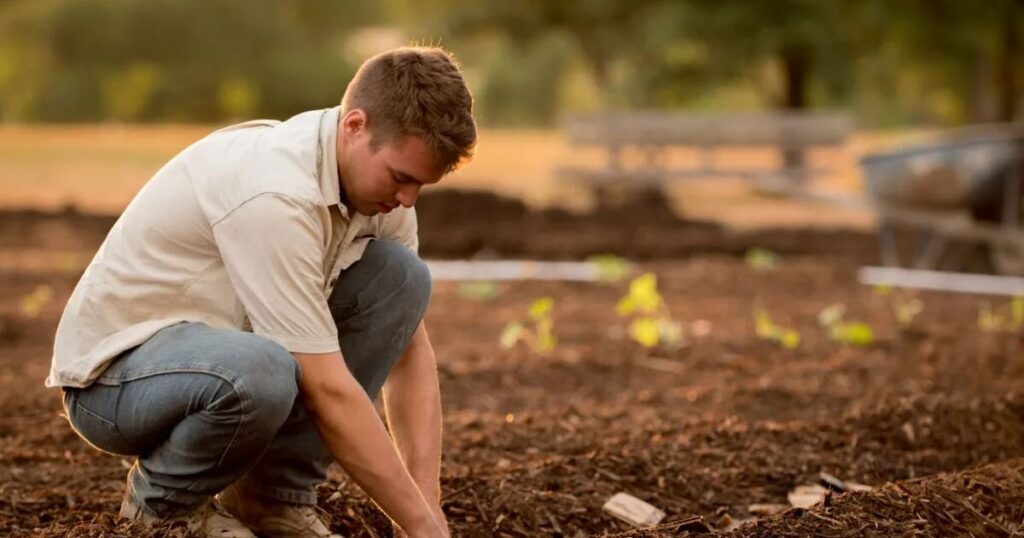Seeds are small yet powerful. They symbolize new beginnings, growth, and the potential to flourish into something magnificent. In the Bible, the concept of planting seeds is deeply spiritual, encompassing themes of faith, righteousness, and the journey of growth in God’s kingdom. This blog post delves into the profound lessons found in scripture about planting seeds, offering insights that can guide us in our spiritual lives and everyday decisions.
The Symbolism of Seeds in the Bible
planting seeds Bible symbolize faith, growth, and the potential for transformation. They represent the beginning of a spiritual journey that, when nurtured, leads to abundant life in God’s kingdom
Seeds as Symbols of Faith and Growth
planting seeds frequently uses seeds as a metaphor for faith and growth. Just as a tiny seed holds the potential to become a mighty tree, our faith, even when small, has the potential to achieve great things. Matthew 13:31-32 says:
“The kingdom of heaven is like a mustard seed, which a man took and planted in his field. Though it is the smallest of all seeds, yet when it grows, it is the largest of garden plants and becomes a tree, so that the birds come and perch in its branches.”
This passage emphasizes that our faith, no matter how insignificant it may seem, can grow into something that provides shelter and sustenance. Similarly, Mark 4:26-29 presents the Parable of the Growing Seed, illustrating how God works behind the scenes, causing the seed to grow even when we don’t see it.
Key Takeaway: In life, we are often tasked with planting seeds of faith—small acts of kindness, moments of prayer, or steps toward righteousness—that God will nurture and grow in ways we cannot foresee.
Planting Seeds of Righteousness
Planting seeds of righteousness is another significant theme in the Bible. Hosea 10:12 instructs us:
“Sow righteousness for yourselves, reap the fruit of unfailing love, and break up your unplowed ground; for it is time to seek the Lord, until He comes and showers His righteousness on you.”
This verse reminds us that our actions—our seeds—have consequences. When we plant righteousness, we are sowing the seeds for a harvest of love, peace, and divine favor. It’s a call to proactive living, where our choices reflect our faith and commitment to God’s principles.
Fact:planting seedsrighteousness” appears over 500 times in the Bible, often linked with the concept of sowing and reaping.
Scripture About Planting Seeds of Faith
Scripture about planting seeds of faith emphasizes the power of even the smallest acts of faith, illustrating how they can grow into something mighty and impactful when nurtured by God’s grace.
Parables That Teach About Sowing and Reaping
One of the most profound teachings in the New Testament is the Parable of the Sower, found in Matthew 13:3-9. This parable describes a sower who scatters seeds, which fall on different types of ground: the path, rocky places, thorns, and good soil. Each type of soil represents the condition of the human heart and how it receives the word of God.
- The Path: Represents those who hear the word but do not understand it, allowing the evil one to snatch it away.
- Rocky Places: Represents those who receive the word with joy but fall away when trouble arises because they have no root.
- Thorns: Represents those who hear the word but are choked by life’s worries, wealth, and pleasures.
- Good Soil: Represents those who hear the word, understand it, and produce a crop yielding a hundred, sixty, or thirty times what was sown.
This parable emphasizes the importance of where and how we plant seeds of faith, urging us to cultivate “good soil” in our hearts.
Aslo More About Blog:An Extensive Care Guide about Redwood Bonsai
Lessons on Stewardship and Responsibility
In 2 Corinthians 9:10, Paul writes:
“Now He who supplies seed to the sower and bread for food will also supply and increase your store of seed and will enlarge the harvest of your righteousness.“
This scripture highlights God’s role as the ultimate provider of the resources we need to sow seeds of faith. It also underscores our responsibility to use these resources wisely. Whether it’s our time, talents, or treasures, we are stewards of the gifts God has given us. We are called to plant these seeds in ways that honor Him, ensuring that they yield a fruitful harvest.
Table: Stewardship Principles in Scripture
| Principle | Scripture Reference | Key Insight |
| Ownership | Psalm 24:1 | God owns everything; we are merely stewards. |
| Responsibility | Luke 16:10-11 | Faithfulness in small things leads to greater trust. |
| Accountability | Romans 14:12 | We will give an account for how we manage God’s gifts. |
| Reward | Colossians 3:23-24 | God rewards those who serve Him with integrity. |
The Power of Small Beginnings

The power of small beginnings in scripture teaches that even the tiniest seed of faith can lead to great outcomes, reminding us that God can transform modest efforts into significant blessings.
The Mustard Seed – A Tiny Seed with Great Potential
One of the most quoted scriptures about planting seeds is Matthew 17:20
“He replied, ‘Because you have so little faith. Truly I tell you, if you have faith as small as a mustard seed, you can say to this mountain, “Move from here to there,” and it will move. Nothing will be impossible for you.'”
This verse speaks to the immense power that lies in even the smallest amount of faith. The mustard seed, though tiny, is capable of producing a large tree, illustrating that our faith, though small, can overcome seemingly insurmountable obstacles when nurtured.
Case Study: Consider the story of George Müller, a Christian evangelist who established orphanages in the 19th century. With nothing but faith and prayer, he raised millions of pounds (equivalent to billions today) to care for over 10,000 orphans. His life is a testament to what a mustard seed of faith can accomplish.
Nurturing the Seeds of Faith
Growing a seed into a thriving plant requires more than just planting—it requires nurturing. Galatians 6:7-9 provides guidance on this:
“Do not be deceived: God cannot be mocked. A man reaps what he sows. Whoever sows to please their flesh, from the flesh will reap destruction; whoever sows to please the Spirit, from the Spirit will reap eternal life. Let us not become weary in doing good, for at the proper time we will reap a harvest if we do not give up.”
This passage encourages persistence and diligence in nurturing our faith. It reminds us that the harvest comes in due season, and we must continue to care for the seeds we’ve planted through prayer, study, and righteous living.
Planting Seeds in Others – Spreading the Gospel

Planting seeds in others through spreading the Gospel highlights our role in sharing God’s word, trusting that He will nurture and grow the faith we’ve helped to sow in receptive hearts.
The Call to Evangelism
Corinthians 3:6-9 captures the collaborative nature of planting seeds in others:
“I planted the seed, Apollos watered it, but God has been making it grow. So neither the one who plants nor the one who waters is anything, but only God, who makes things grow. The one who plants and the one who waters have one purpose, and they will each be rewarded according to their own labor. For we are co-workers in God’s service; you are God’s field, God’s building.”
This scripture emphasizes that while we may plant or water seeds of faith in others, it is ultimately God who causes them to grow. Our role in evangelism is crucial, but it’s important to remember that the results are in God’s hands. This relieves us from the pressure of seeing immediate results, encouraging us to focus on faithful sowing.
The Impact of Sowing in Good Soil
Matthew 13:8 speaks to the outcome of sowing in good soil:
“Still other seed fell on good soil, where it produced a crop—a hundred, sixty, or thirty times what was sown.”
This verse illustrates the importance of sharing the Gospel with receptive hearts. When we sow seeds of faith in fertile ground—those ready and willing to receive the word—we see an abundant harvest. This can be applied to personal evangelism, community outreach, and missions, reminding us to seek out those who are open to the message of Christ.
Quote: “The world is full of seeds waiting to be planted in the right soil. Our job is to find that soil and let God do the rest.”
Reaping What You Sow – The Biblical Principle of Harvest
The biblical principle of reaping what you sow teaches that our actions have consequences, encouraging us to plant seeds of righteousness to harvest God’s blessings and spiritual growth.
Understanding the Law of Sowing and Reaping
The principle of sowing and reaping is a foundational concept in both the physical and spiritual realms. Galatians 6:7 states:
“Do not be deceived: God cannot be mocked. A man reaps what he sows.”
This verse underscores the inevitable connection between our actions (sowing) and their consequences (reaping). Just as a farmer cannot expect to harvest wheat after planting thorns, we cannot expect to reap blessings if we sow seeds of sin or selfishness. This principle encourages us to be mindful of our choices, ensuring that we are planting seeds that will yield positive, godly outcomes.
The Harvest of Righteousness
James 3:18 gives insight into what we can expect when we sow in righteousness:
“Peacemakers who sow in peace reap a harvest of righteousness.”
This passage highlights the rewards of living a life dedicated to peace and righteousness. The “harvest” here is not just material blessings but spiritual growth, peace of mind, and a closer relationship with God. This aligns with the broader biblical theme that the greatest rewards are often spiritual rather than material.
Conclusion
Scripture about planting seeds reminds us that our faith, actions, and efforts, though small, have the potential to grow into something powerful when nurtured by God. By sowing seeds of righteousness, faith, and love, we contribute to a harvest that reflects God’s grace and purpose in our lives.

I am Alexander James, a seasoned professional with 4 years of expertise, brings passion and skill to every project. Elevate your experience with my knowledge and creativity.



![Hollyhock Seeds: The Complete Guide to Success [2024]](https://seederabout.com/wp-content/uploads/2024/10/Hollyhock-Seeds-The-Complete-Guide-to-Success-2024-300x157.jpg)





